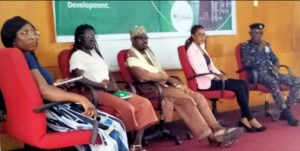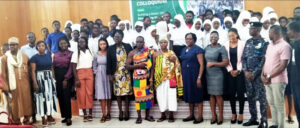An Islamic Cleric has observed that harmful practices perpetrated against teenagers, especially early and forced marriage or female genital mutilation, which is practised predominantly in muslim communities are not in line with Islamic teachings or the Quran.
He explained that “attitude is different from religion and most of the harmful practices are based on ones attitude”.
Sheikh Ustaz Burhanu Deen Babalwaiz made these observations in a keynote address at the ‘Inter-Gen Colloquium’, organised by Curious Minds, a Non Governmental Organisation (NGO), in partnership with UNICEF, at the SSNIT Conference Room last week Thursday, in Kumasi.

The Inter-Gen Colloquium was under the theme: ‘Building a Better Ghana: Eliminating Harmful Practices for Sustainable Development’. It was aimed at enlightenment, empathy and empowerment so that every individual can exercise their rights with dignity, irrespective of gender and circumstance.
He said some people have paedophile desire for small children or girls, which is attitudinal and not based on any Islamic teaching, emphasising that early and forced marriage was an abomination (Haram) in Islam.
Sheikh Ustaz Babalwaiz, who is also the Deputy Secretary at the Office of the Regional Chief Imam said, the Quran abhors such practices in all forms and that Islam prescribes punishment for offenders of such practices.
The Cleric advised parents to always do their best to train their children from home because leadership starts from childhood, adding that Islam does not stop anyone, especially women, from continuing their education even after marriage.
Police Chief Inspector Eric Asare, at the Legal and Prosecution Unit of the Regional Police Headquarters recommended that victims of defilement or rape should be compensated because parents and relatives of the victims go through a lot during the prosecution of defilement or rape cases.

He explained that rape victims and families would rather prefer to prosecute offenders at the law courts and get compensated if perpetrators are found guilty, rather than settling cases involving domestic violence at home.
Nana Osei Bediako, Dwenedabihene of the Offinso Traditional Council (OTC), stated that the OTC has cautioned all chiefs in the traditional area to desist from any “out of court settlement” on any issue that relate to harmful practices or domestic violence.
The Finance and Operations Manager of Curious Minds, Mr. Prince Kwesi Bonney, lamented that “the persistence of practices such as child and forced marriage, child labour, gender-based violence and female genital mutilation amongst others, cast a shadow upon the fundamental principles of dignity and equality”, which does not “only impede individual progress but also hinder our collective development”.
Mr. Bonney said the colloquium was a beacon of hope and a platform which brought together dedicated hearts including researchers, policymakers, community leaders and advocates “to address these unethical practices that have marred our societal fabric” and find innovative solutions to eliminating same.
From Thomas Agbenyegah Adzey, Kumasi








